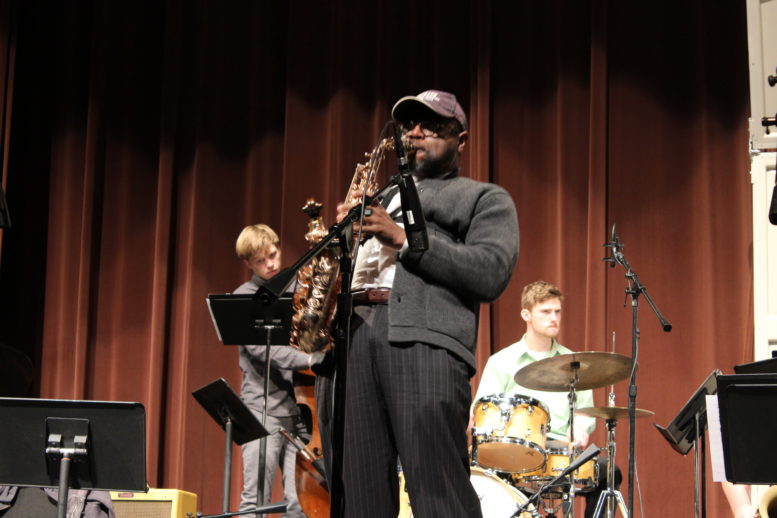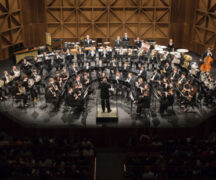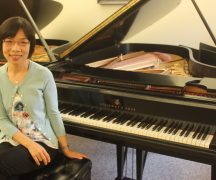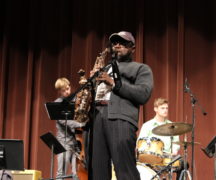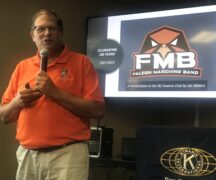By DAVID DUPONT
BG Independent News
When Antonio Hart first took the stage at Bowling Green State University, he had some stern advice for the music students in the audience. Ask me questions. Citing his experience playing with some of the greats in jazz, he said students needed to take advantage of having him among them for a while.
Then he played demonstrating the mastery students could aspire to.
That was Wednesday night when Hart performed with the jazz faculty, arriving shortly before from Thailand. He was in town through Thursday before leaving on an early morning flight back to New York before heading back east to China.
Hart is a man on the move, squeezing as much as he can during his sabbatical from Queens College in New York City where he teaches.
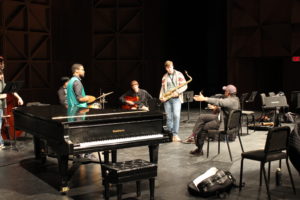
Antonio Hart coaches student chamber jazz ensemble at BGSU Thursday.
Still when Adonai Henderson took him up on his offer to ask a question Thursday after a coaching session with small bands, it was as if time stopped. As the crew reset the Kobacker stage for the Lab I rehearsal and concert, Hart sat at the piano and gave Henderson a lesson.
During the session before, Hart had drilled the quintet Henderson was a part of on the proper execution of the melody to Charlie Parker’s “Scrapple from the Apple.” It’s a bebop standard many fans and even players may take for granted. Something to set the stage before the improvisation.
But Hart brought such notions up short. It’s the beginning and end of a tune that stays with the listener. He spent a good half hour with group, on how to articulate each phrase of the melody, giving proper weight the key notes, gradually playing louder to the point where two high notes pop out. Now after the session, Henderson approached Hart. He wasn’t exactly sure he knew how to phrase the melody. Hart had him go over it, and then do a scale exercise to work on his point. They may very well have been in a private studio, not a concert hall with a dozen or so people working and milling about.
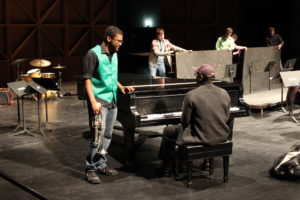
Adonai Henderson gets impromptu lesson from Antonio Hart.
This is what drew Henderson, from Cleveland, to study jazz, the sense of “being so thoroughly inside the music.” And Hart gave him a new way to realize that feeling.
Hart knows the importance of education. He grew up in inner city Baltimore. Just as he was getting ready to go to high school, art and music were cut from the curriculum. “That was going to be a drag for me because that was the only reason I dug school,” Hart said in an interview, “because it wasn’t happening education-wise.”
He had a friend who was attending the Baltimore School for the Arts and helped him get an audition. He got in though he was aware of deficiencies in his training. “I was very behind academically,” he said. “There’s stuff still I have to learn.”
Hart said he sometimes he gets frustrated with the college students he teaches. “Sometimes I get upset with them because they have all these facilities and materials that I didn’t have, and they don’t practice, they don’t take advantage of them.” He has to step back and realize “everybody doesn’t have the same intensity I have.” Still he wants them to see how passionate he is about the music.
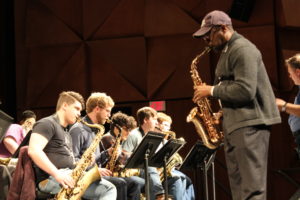 That passion was evident during his two public performances on campus. On Wednesday he played with the jazz faculty. Sometimes even he seemed surprised by his own playing, stopping to laugh. Whether he was playing an incendiary swing tune or a ballad, Hart was all in. And he wasn’t satisfied unless he could pull his listeners in as well.
That passion was evident during his two public performances on campus. On Wednesday he played with the jazz faculty. Sometimes even he seemed surprised by his own playing, stopping to laugh. Whether he was playing an incendiary swing tune or a ballad, Hart was all in. And he wasn’t satisfied unless he could pull his listeners in as well.
For the closing blues, he divided the audience in Bryan Recital Hall into three, akin to the trombone, saxophone and trumpet sections of a swing band. Each section got a part to sing. The exercise was a throwback to the head arrangements the Count Basie Band would put together on the stand, arrangements that evolved into some of the great swing tunes.
Thursday night’s concert with Lab Band I, conducted by Jeff Halsey, also closed with a blues. Not a coincidence. The blues is music listeners can connect to emotionally. In rehearsing the chart early in the day with the big band, Hart told the musicians “you’ve got to imagine people dancing in front of you.” He brings his Queens College students to African-American churches so they get the feel of the physicality of the music.
In schools students learn what notes to play, “the math of it.”
“But they don’t understand the human element, where it came from.”
Hart has sought out his elders to learn from them. That includes Frank Wess, long-time saxophonist and flutist with the Count Basie Band. Hart recalled visiting Frank Wess shortly before his death. Wess was hardly in condition to play, but still they jammed together for two hours. “The passion that came out of that horn is something that was haunting. To me just to see that at the end he has this thing. Those notes meant something, a whole different meaning.”
After Hart graduated from Berklee College of Music in Boston, he went to Queens College to get a master’s degree specifically to study with the master saxophonist, composer and arranger Jimmy Heath. They became close. Heath is a father figure to Hart. He goes over to the elder musician’s home just to sit and watch a ballgame (though Hart said he has no interest in spectator sports) and talk. He was overwhelmed during one visit when Heath brought him back into his studio to show him a chart he was working on. It was for Hart, and the title was “Like a Son.” Hart said he almost cried when he saw that. Hart recorded the composition on Heath’s “Turn Up the Heath” session. In the liner notes the composer said Hart played the tune with “clarity, energy and consistency of spirit.” Qualities evident as well when, all smiles, when he played it with the BGSU Lab Band Thursday.
That’s the spirit he wants young players to catch. He said he’s found it in the singers and saxophonists he heard during his trip to Thailand. “You could see them surrender to the music. I was totally blown away.”
That’s the spirit and the connection to “the rhythm on the street” that’s needed to engage contemporary audiences. That’s the charge for younger players. At 47 he considers himself one of those musicians, though one in transition. “I had the band out for many years. I just got jaded. I’ve been a sideman for many years. Now I’m at the point that it’s time for me to do my own thing, but I don’t know what my own thing is yet.”
That’s part of the reason for going to Thailand and China, where he’ll perform and engage in his love of martial arts and tea. He wants “to get away from this county, separate, just mediate and do things that maybe open me up and so I can figure where I want to go next musically.”

